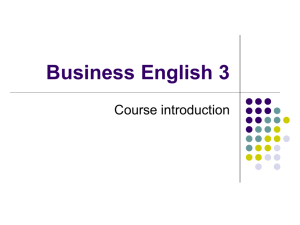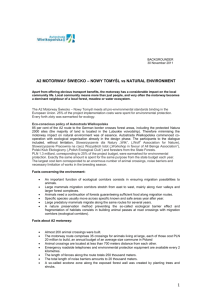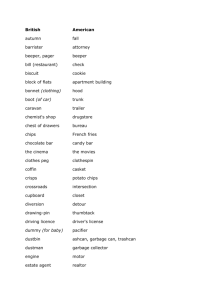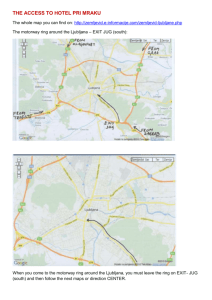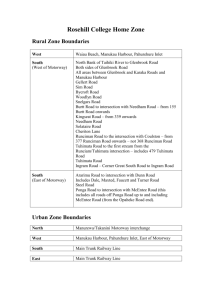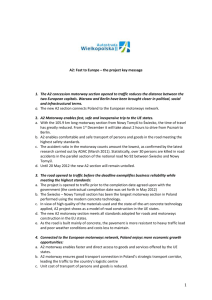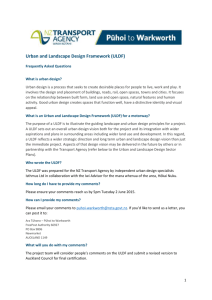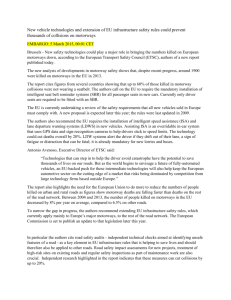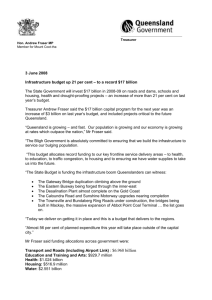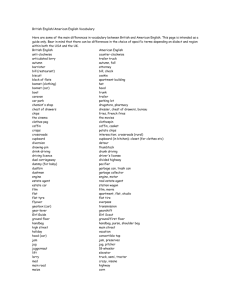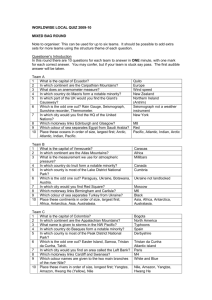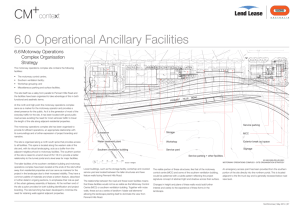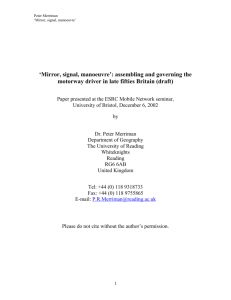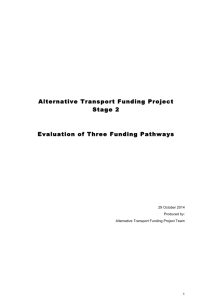Hypothetical Case Study 2: monopoly high pricing
advertisement
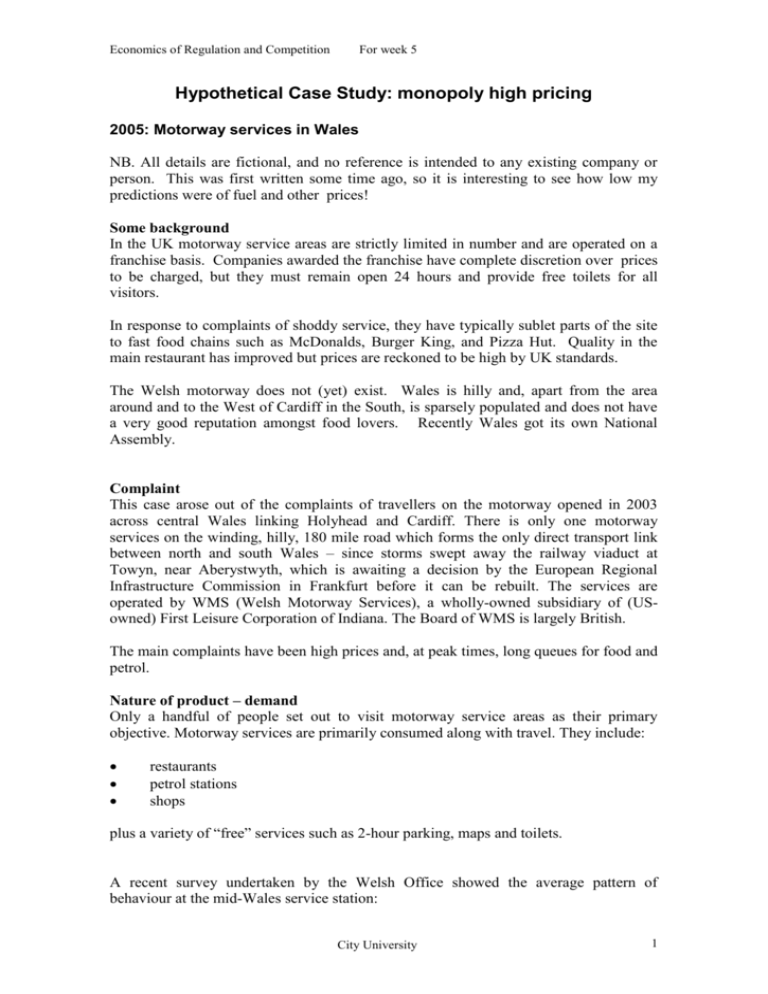
Economics of Regulation and Competition For week 5 Hypothetical Case Study: monopoly high pricing 2005: Motorway services in Wales NB. All details are fictional, and no reference is intended to any existing company or person. This was first written some time ago, so it is interesting to see how low my predictions were of fuel and other prices! Some background In the UK motorway service areas are strictly limited in number and are operated on a franchise basis. Companies awarded the franchise have complete discretion over prices to be charged, but they must remain open 24 hours and provide free toilets for all visitors. In response to complaints of shoddy service, they have typically sublet parts of the site to fast food chains such as McDonalds, Burger King, and Pizza Hut. Quality in the main restaurant has improved but prices are reckoned to be high by UK standards. The Welsh motorway does not (yet) exist. Wales is hilly and, apart from the area around and to the West of Cardiff in the South, is sparsely populated and does not have a very good reputation amongst food lovers. Recently Wales got its own National Assembly. Complaint This case arose out of the complaints of travellers on the motorway opened in 2003 across central Wales linking Holyhead and Cardiff. There is only one motorway services on the winding, hilly, 180 mile road which forms the only direct transport link between north and south Wales – since storms swept away the railway viaduct at Towyn, near Aberystwyth, which is awaiting a decision by the European Regional Infrastructure Commission in Frankfurt before it can be rebuilt. The services are operated by WMS (Welsh Motorway Services), a wholly-owned subsidiary of (USowned) First Leisure Corporation of Indiana. The Board of WMS is largely British. The main complaints have been high prices and, at peak times, long queues for food and petrol. Nature of product – demand Only a handful of people set out to visit motorway service areas as their primary objective. Motorway services are primarily consumed along with travel. They include: restaurants petrol stations shops plus a variety of “free” services such as 2-hour parking, maps and toilets. A recent survey undertaken by the Welsh Office showed the average pattern of behaviour at the mid-Wales service station: City University 1 Economics of Regulation and Competition For week 5 Table 1: Spending pattern of visitors to service station in the year 2005 Leisure Business Transport Average parking time 45 mins 40 mins 60 mins Average spending on: Restaurant £15 £8 £5 Fuel £8 £15 £18 Shopping &c. £2.50 £2.50 £1.50 Typical journey cost £50 £55 £100 Number if vehicles per day 2000 2200 1800 These spending patterns include the 30% of visitors who use the services but spend nothing. Leisure and business users mainly drive cars and multi-purpose vehicles (95% petrol driven). Transport drivers drive a range of vehicles, from Tranisent vans to 8-axle, 60 tonne “Cobber” road trains. These transport vehicles are 95% diesel. The market-prices The Competition Commission commissioned a survey from a leisure consultancy, who collected the following information on meal prices. Table 2: Survey of Restaurant Prices Type of restaurant WMS English Eat’n’Go Food Motorway (‘A’ roads) £5.00 £4.20 £3.90 Fish and chips £2.70 £2.40 £2.00 4oz lamburger £4.70 £4.00 £3.70 Bacon and eggs £2.70 n.a. n.a. Welsh Rarebit £1.20 £1.00 £1.00 Coffee £0.90 Tea (Pot for £1.00 £1.00 one) £0.65 £0.65 £0.60 Roll and butter Greasy Spoon (‘A’ roads) £3.40 n.a. £2.50 £1.20 £0.50 £0.50 Vaderbuilt Plaza (Cardiff) £8.50 n.a. £6.70 £3.00 £1.50 £1.50 £0.40 £1.00 Note : Fish and chips is a popular British restaurant dish. Welsh rarebit is melted cheese on toasted bread. Greasy spoon is colourful language for a cheap basic café. Table 3: Fuel prices Fuel £ per litre Unleaded regular Diesel WMS £0.63 Type of outlet English Welsh Motorway ‘A’ road £0.61 £0.60 Supermarket £0.58 £0.50 £0.51 £0.48 City University £0.49 2 Economics of Regulation and Competition For week 5 The market – costs WMS’s cost structure is shown in the following Table. The site rent covers a charge for depreciation and interest on the building costs incurred when the services were opened. Annual Costs Site rent (to group holding company Of which petrol station Maintenance of common areas Restaurant: Staff Materials, etc. Petrol station: Total expenses (excluding Rent) £20,000,000 Site total £54,500,000 £5m £6,000,000 £3,500,000 £5,000,000 £20,000,000 The market – revenues WMS’s revenues are obtained largely from operation of the motorway service area. Table 4: WMS Source of revenue Source Annual revenues Restaurant Fuel Shopping £20.6m £29.7m £4.8m Total £55.2m Views of Customers Transport drivers noted that prices were twice as high as in typical transport cafés, and 20% higher than in typical English motorway service stations. The situation had been improved slightly for regular drivers by the introduction of a loyalty card giving 20% reductions once a minimum accumulated spending of £50 was triggered. Other customers noted the isolation of the spot, but claimed this should mean that prices should be lower, not higher. A number of regular travellers said they had tried going off the motorway with limited success “but everything seems to shut at 5.30 round here”. Other customers were very pleased with the standard of service “at least when the place isn’t too busy”. City University 3 Economics of Regulation and Competition For week 5 The Company’s views The relevant market was motorway travel, of which motorway services were just one input. The cost of the whole product should be looked at. Viewed in this way it was still cheaper to travel down the Welsh motorway than to go via the northern coast road and M5. More fuel would be required, more stops for food, and more time spent. The service station operating company admitted that prices were higher than in comparable restaurants on A roads, but claimed that this was the result of higher costs arising from the need to open 24 hours and to provide toilet facilities to all comers, whether they spent any money or not. The situation in mid-Wales gave rise to further difficulties. Staff had to be bussed in from as far away as 50 miles, and all food had to come along the motorway from Cardiff. Because of this the standard contract was for 8 hour shifts, which made it uneconomic to employ staff simply to cope with the 2 daily peaks, 7.30 – 9.30 am and 4.30 – 6.30 pm. WMS claimed that the standard of service on the site was much better than at English Motorway services. All customers were assigned a personal serving assistant, and, except at peak times, the aim was to get the customers back on the road within 35 minutes of arrival in the restaurant. Because or the superior ambience, price levels should be compared with a 4-crest hotel, such as in the new Vaderbuilt Plaza chain. The company denied they had a monopoly. Nobody forces people to use the facilities. Drivers could fill up before the start of their journal, and could take food with them: indeed, a recent survey showed that as many as 20% of visitors brought food with them to eat in their vehicles, twice the figure of English motorways. Those who patronised the café, therefore, had to subsidise these others, since the licence terms did not permit charges for short-term parking or use of toilet facilities, on grounds of road safety and public health. The company offered a “back to basics” range of items, including tea, coffee, and simple snacks which the company believed were competitively priced. Another example of competition was in diesel prices. Commercial drivers were well aware of price differences, and their vehicles had longer ranges than domestic vehicles. If prices were too high, these drivers would fill up before their journey started. The site was only marginally profitable – profits were only 1.4% of turnover – so it was difficult to see how the service area could afford to reduce any of its prices, unless service standards were allowed to fall. The views of other parties The chairman of the Eat’n’Go chain, Mr Dicky Bramsgrove, said they had tried to establish “just-off-the-Motorway services” to gain economies of scope from serving both local and long-distance travellers, but had faced difficulties from the planning authorities, particularly in National Park areas. Unlike in America it was difficult to advertise “off-the-motorway services”, so they had reluctantly abandoned the idea. City University 4 Economics of Regulation and Competition For week 5 Questions for consideration 1. What further information would you seek? (up to three items, in order of priority). 2. What is the relevant market or markets? (Make explicit reference to substitutes.) Are there separate segments within the market thus defined? 3. Are entry barriers significant? (What is their source?) 4. Is there dominance in this market? 5. Is there any evidence that prices are excessive? 6. Is there any evidence of price discrimination? 7. Is a remedy called for? If so, suggest some alternatives. Which do you prefer? John Cubbin City University 5
